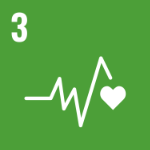

3. Good health and well-being

8. Decent work and economic growth
Technostress
In recent years, we have seen an unprecedented increase in the use of information and communication technologies(ICT) at work. In this research project, we seek to explore the harmful effects of technology (resulting from the adaptation of ICT to the world of work), with a special focus on the interaction between technostress, the addition of mobile ICT, and (in) recovery capacity. Technostress is a disease that results from the inability to deal with ICTs in a healthy way and reveals a dependence on them. The addition consists of a negative psychological state demonstrated through obsessive dependence and compulsive behaviors (not very functional)when using ICT, which causes psychological and physiological damage and decreases professional performance. The personal context and possible background of technostress and the consequences for health and productivity were studied on this topic. The interaction between family and professional domains was also one of the factors analyzed, as one of the consequences ofusing ICT is the loss of definition of the boundaries between these two aspects.
Filipa Castanheira and Pedro Neves, from Nova SBE Leadership for Impact Knowledge Center, were interviewed by Expresso and Eco about the Technostress study carried out by both. The work demonstrated that “the more useful the technology is, the more vulnerable are the people who feel technostress, because this combination generates addiction, and this generates more technostress”, explained Filipa Castanheira. Pedro Neves pointed out that “we found that this not only promotes a vicious cycle that increases as time goes by but, on the other hand, people end up being unable to do their job because they are focused on what technology can bring”. “Compulsive behaviors, anxiety, difficulty in sleeping or waking up in the middle of the night thinking about work” are some indicators of technostress, said the professor.

